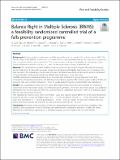Files in this item
Balance Right in Multiple Sclerosis (BRiMS) : a feasibility randomised controlled trial of a falls prevention programme
Item metadata
| dc.contributor.author | Gunn, H. | |
| dc.contributor.author | Stevens, K. N. | |
| dc.contributor.author | Creanor, S. | |
| dc.contributor.author | Andrade, J. | |
| dc.contributor.author | Paul, L. | |
| dc.contributor.author | Miller, L. | |
| dc.contributor.author | Green, C. | |
| dc.contributor.author | Ewings, P. | |
| dc.contributor.author | Barton, A. | |
| dc.contributor.author | Berrow, M. | |
| dc.contributor.author | Vickery, J. | |
| dc.contributor.author | Marshall, B. | |
| dc.contributor.author | Zajicek, J. | |
| dc.contributor.author | Freeman, J. A. | |
| dc.date.accessioned | 2021-01-28T10:30:03Z | |
| dc.date.available | 2021-01-28T10:30:03Z | |
| dc.date.issued | 2021-01-04 | |
| dc.identifier | 272576701 | |
| dc.identifier | 7bfdc665-92f4-429a-bfb1-8694869fc53f | |
| dc.identifier | 85098537358 | |
| dc.identifier | 000704715200003 | |
| dc.identifier.citation | Gunn , H , Stevens , K N , Creanor , S , Andrade , J , Paul , L , Miller , L , Green , C , Ewings , P , Barton , A , Berrow , M , Vickery , J , Marshall , B , Zajicek , J & Freeman , J A 2021 , ' Balance Right in Multiple Sclerosis (BRiMS) : a feasibility randomised controlled trial of a falls prevention programme ' , Pilot and Feasibility Studies , vol. 7 , no. 1 , 2 . https://doi.org/10.1186/s40814-020-00732-9 | en |
| dc.identifier.issn | 2055-5784 | |
| dc.identifier.other | RIS: urn:505366240643B3ACC6342A439DC30DA0 | |
| dc.identifier.other | RIS: Gunn2021 | |
| dc.identifier.uri | https://hdl.handle.net/10023/21339 | |
| dc.description | This study was funded by the NIHR Health Technology Assessment Programme (14/176/12), United Kingdom. | en |
| dc.description.abstract | Background Balance, mobility impairments and falls are problematic for people with multiple sclerosis (MS). The “Balance Right in MS (BRiMS)” intervention, a 13-week home and group-based exercise and education programme, aims to improve balance and minimise falls. This study aimed to evaluate the feasibility of undertaking a multi-centre randomised controlled trial and to collect the necessary data to design a definitive trial. Methods This randomised controlled feasibility study recruited from four United Kingdom NHS clinical neurology services. Patients ≥ 18 years with secondary progressive MS (Expanded Disability Status Scale 4 to 7) reporting more than two falls in the preceding 6 months were recruited. Participants were block-randomised to either a manualised 13-week education and exercise programme (BRiMS) plus usual care, or usual care alone. Feasibility assessment evaluated recruitment and retention rates, adherence to group assignment and data completeness. Proposed outcomes for the definitive trial (including impact of MS, mobility, quality of life and falls) and economic data were collected at baseline, 13 and 27 weeks, and participants completed daily paper falls diaries. Results Fifty-six participants (mean age 59.7 years, 66% female, median EDSS 6.0) were recruited in 5 months; 30 randomised to the intervention group. Ten (18%) participants withdrew, 7 from the intervention group. Two additional participants were lost to follow up at the final assessment point. Completion rates were > 98% for all outcomes apart from the falls diary (return rate 62%). After adjusting for baseline score, mean intervention—usual care between-group differences for the potential primary outcomes at week 27 were MS Walking Scale-12v2: − 7.7 (95% confidence interval [CI] − 17.2 to 1.8) and MS Impact Scale-29v2: physical 0.6 (CI − 7.8 to 9), psychological − 0.4 (CI − 9.9 to 9). In total, 715 falls were reported, rate ratio (intervention:usual care) for falls 0.81 (0.41 to 2.26) and injurious falls 0.44 (0.41 to 2.23). Conclusions Procedures were practical, and retention, programme engagement and outcome completion rates satisfied a priori progression criteria. Challenges were experienced in completion and return of daily falls diaries. Refinement of methods for reporting falls is therefore required, but we consider a full trial to be feasible. Trial registration ISRCTN13587999 | |
| dc.format.extent | 1738783 | |
| dc.language.iso | eng | |
| dc.relation.ispartof | Pilot and Feasibility Studies | en |
| dc.subject | Secondary progressive multiple sclerosis | en |
| dc.subject | Exercise | en |
| dc.subject | Self-management | en |
| dc.subject | Mobility | en |
| dc.subject | Accidental falls | en |
| dc.subject | Balance | en |
| dc.subject | Quality of life | en |
| dc.subject | Feasibility randomised controlled trial | en |
| dc.subject | RA0421 Public health. Hygiene. Preventive Medicine | en |
| dc.subject | E-DAS | en |
| dc.subject | SDG 3 - Good Health and Well-being | en |
| dc.subject.lcc | RA0421 | en |
| dc.title | Balance Right in Multiple Sclerosis (BRiMS) : a feasibility randomised controlled trial of a falls prevention programme | en |
| dc.type | Journal article | en |
| dc.contributor.institution | University of St Andrews. School of Medicine | en |
| dc.contributor.institution | University of St Andrews. Cellular Medicine Division | en |
| dc.identifier.doi | 10.1186/s40814-020-00732-9 | |
| dc.description.status | Peer reviewed | en |
This item appears in the following Collection(s)
Items in the St Andrews Research Repository are protected by copyright, with all rights reserved, unless otherwise indicated.

